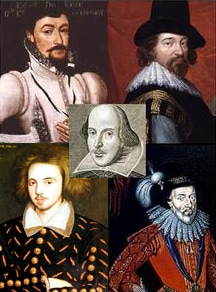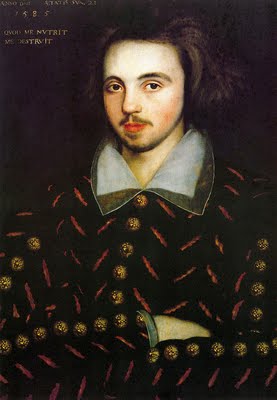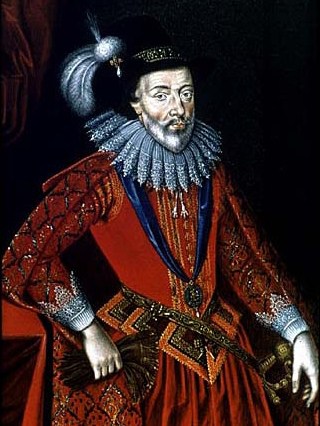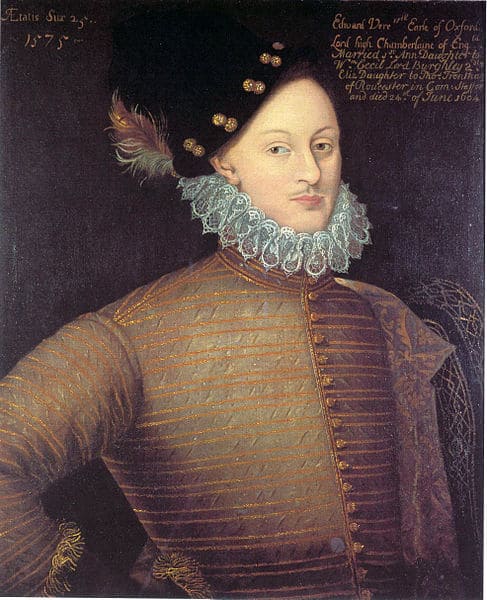
Why are there so many Shakespeare authorship candidates?
For many people, an understandable question arises, even if one does begin to doubt the Stratford story: “Granted, there does seem to be a problem with the Stratford man as the author. But why are there so many candidates? Why should I choose the Shakespeare Oxford Fellowship’s candidate over such illustrious figures as Francis Bacon or Christopher Marlowe? Haven’t these Elizabethan writers had as many, if not more, passionate adherents than the more obscure Earl of Oxford?”
The sheer number of candidates proposed for the “Shakespeare” laurels is indeed noteworthy. The situation is unique. Such doubts exist for no other writer of Shakespeare’s historic importance. Orthodox scholars would have us believe that the number of alternative theories invalidates the entire inquiry. To them, since it is obvious that all of the candidates to replace William Shakspere of Stratford-upon-Avon cannot be the author, therefore none of them can be.
But that is laughably and obviously illogical. It does not follow. The amazing number of candidates is powerful testimony to the deep dissatisfaction so many thoughtful people have felt, for so long, when it comes to the implausible traditional theory.
Among 70 or more Elizabethans suggested over the years as the true Shakespeare, four have inspired and merited especially extensive and serious consideration: Sir Francis Bacon, Christopher Marlowe, William Stanley (Sixth Earl of Derby), and Edward de Vere (17th Earl of Oxford). Following is a summary of arguments that many scholars have offered against the first three candidates.
Francis Bacon

Though possessed of much learning, sophistication, and keen intellect, Francis Bacon expressed these qualities in a manner very different from Shakespeare, whose work has been described by many commentators as charged throughout with imagination, passion, and idealism. Though both Bacon and Shakespeare had wide knowledge of the law, Shakespeare’s usages of legal terminology, unlike Bacon’s, are richly metaphorical.
The known verse of Bacon that has come down to us, such as his metrical settings of the Psalms, is stilted, as unlike Shakespeare as it could possibly be. More importantly, it is difficult to imagine how Bacon, with the full life he led and his many other literary and official preoccupations, could also have found time to compose 37 or more plays, 154 sonnets, and two long narrative poems of the quality these works exhibit.
Supposed ciphers or cryptograms some claim to find in the works of Shakespeare, said to support Bacon’s authorship, were long ago debunked.
Finally, since Bacon lived until 1626, through the time of the First Folio of 1623, one wonders why he failed to correct the cornucopia of textual problems left unresolved in that publication. As is well known, the Folio expressed regret that the author was “by death” deprived of the chance “to have set forth, and overseen his own writings.” That fits perfectly with Oxford’s death in 1604 but very uneasily with Shakspere’s years of retirement in Stratford up to 1616 — and even more so with Bacon’s long and prolific literary career during which he carefully wrote and polished numerous lengthy works. As J. Thomas Looney (founder of the modern Oxfordian theory) noted in a 1923 essay (“Shakespeare: Was It Oxford, Bacon, or Derby?” in “Shakespeare” Revealed, Warren ed. 2019, 195, 196), “so overwhelming is the internal evidence that the [Folio] is not an author’s production” that the “whole weight of probability is … in favour of his being dead at that time.”
As discussed on the SOF “Authorship 101” page, there are several compelling indications that the author “Shakespeare” (whoever it was) died many years before 1616, certainly long before Bacon’s death in 1626.
Oxfordians will always honor the Baconians of the 19th and early 20th centuries. Persevering against much hostility, they made an enormous contribution to dismantling the implausible traditional theory. We all stand on their shoulders. It is understandable why Bacon was first identified as the most plausible alternative. But we know far more now than we did then. Baconians had the right idea, but the wrong guy. Happens to the best of us.
Christopher Marlowe

This great Elizabethan dramatist, born the same year as Shakspere of Stratford (1564), died in 1593 at the age of 29, on the eve of the first publication of works appearing under the name “Shakespeare.” To overcome the apparent obstacle posed by his death (seemingly far too early to account for plays and poems apparently written years later), Marlowe’s supporters point to irregularities in the coroner’s inquest. They speculate that Marlowe did not really die that year, but fled abroad and lived on to write the Shakespearean works (somehow transmitting them regularly back to England), a subterfuge necessitated by an official cover-up of his activities as a spy for the Crown.
But the inquest irregularities do not prove, nor even logically suggest, that Marlowe survived 1593. Conceivably they may have been fabricated to cover up the true cause of his death. What they actually suggest is that it was a hit job. He was probably assassinated. That reinforces the likelihood that he did die, in any event, one way or another. It is clear enough that powerful people wanted Marlowe dead and thus difficult to imagine how he could have escaped.
There is not only no proof, there is no evidence whatsoever that he survived, a conjecture proposed merely to accommodate the Marlovian authorship theory. It is not just that the conjecture contradicts the documentary record, it contradicts overwhelming circumstantial evidence. This speculation is an extremely fragile hook on which to hang an authorship theory.
There are many other objections as well, including stylistic discrepancies, notwithstanding the numerous Shakespearean “borrowings” cited by Marlovians, which may simply reflect literary influence. No one doubts that Marlowe influenced “Shakespeare,” whoever that was, just as Marlowe himself was probably influenced by Shakespeare. Conceivably he may have co-authored parts of some “Shakespearean” works, like Henry VI, as even some orthodox Stratfordian scholars have proposed — albeit on the basis of dubious and debatable “stylometric” claims.
Marlowe enthusiasts point to 1593 as the year of the first publication under the name “Shakespeare” (the long poem Venus and Adonis), but they cannot account for the fact that no “Shakespeare” play appeared in print, except anonymously, until 1598. The earliest of these Shakespearean quartos were plays that must have been on the boards during Marlowe’s lifetime and could safely have been ascribed to him when they were published — especially since all the accepted plays by Marlowe were also published or reprinted posthumously and attributed to Marlowe. This latter fact destroys any conceivable motive for attributing other pre-1593 plays to “Shakespeare.”
Beyond all that, scholars have discovered more and more “too early” references to Shakespearean plays, making it impossible for anyone born as late as 1564 (like Marlowe, or Shakspere of Stratford) to be the author. There is compelling evidence, for example, that Henry V — a mature masterpiece thought to be from around the midpoint of the author’s career — dates no later than 1584, when Marlowe and Shakspere were only 20 years old.
Marlowe was born too late, died too soon, and had a distinct and recognizable authorial voice of his own. The popularity and surprising persistence of the Marlovian theory seems driven in part by an understandable romantic fascination with the intriguing and tragic persona of Marlowe himself. It implies no disrespect for this great writer — whom Oxfordians admire and find deeply fascinating — to observe that the Marlovian theory of Shakespeare authorship is simply implausible, not supported by anything remotely comparing to the evidence for the Oxfordian theory.
William Stanley (Derby)

The case for William Stanley (Derby) as Shakespeare rests primarily on two 1599 documents, one describing him as “busied only in penning comedies for the common players,” and the other, by his wife in a letter to Sir Robert Cecil, as “taking delight in the players.”
It is worth pausing to note that Derby’s wife was Elizabeth Vere Stanley, Countess of Derby and Lord of Mann (1575–1627), the eldest daughter of — you guessed it! — Edward de Vere, 17th Earl of Oxford. This documented evidence, that Oxford’s own son-in-law was one of the closeted aristocratic playwrights of the period, serves to confirm how secretive much literary activity associated with the theatre remained. Despite the two letters which record his theatrical activities, no public documents of any sort acknowledge that Derby was a closeted playwright.
In 1918–19 the distinguished French literary historian, Professor Abel Lefranc, published an impressive two-volume argument for Derby as the true Shakespeare. This involvement in the authorship question by Lefranc, a towering figure in French literary studies, is one of those important historical facts which proponents of the orthodox theory of authorship tend to conveniently omit when constructing the fictional claim that no genuine or respected scholars have ever considered the subject worth dignifying.
In fact, Lefranc was one of the most important literary scholars of his generation. While Oxfordians obviously disagree with Lefranc’s specific conclusion with respect to Derby, they generally acknowledge his work as an important contribution to the dialogue on the authorship question.
A centerpiece of Lefranc’s argument is the strong evidence connecting Love’s Labour’s Lost to events in the court of Navarre. There is no question that topical references in this play are an embarrassing complication for orthodox scholars. Shakspere of Stratford was too young at the time, and seems unlikely to have taken much interest in the diplomatic history reflected in the play, or to have had access to the arcana of international politics to which the play makes frequent joking references.
Oxford, however, could easily have learned what he did not know from firsthand experience about Navarre from his known contacts with his son-in-law Derby, his friend Henry IV (then King of Navarre), and others in his international circuit of associates. Hence Eva Turner Clarke, in her 1933 book The Satirical Comedy of Love’s Labour’s Lost, converts Lefranc’s most persuasive evidence into a compelling brief for Oxford’s authorship.
Most of the other arguments put forth by Derbyites likewise apply (and usually better) to Oxford. Many Oxfordians concede that Derby may have had a hand in the composition of some “Shakespeare” plays. That supposition could account for the evidence of collaboration in some of the “late” plays. But the facts of Derby’s life do not fit the autobiographical implications of the Sonnets or many plays (while the facts of Oxford’s life do).
Finally, there is the inconvenient fact that Derby (like Bacon) lived far too long — until 1642 — to fit with the known chronology of the author’s career. Did Derby just fall unaccountably silent for the last 30 years of his life? (Almost the last 38 years, more than 80% of his adult life, if one considers the sudden drop-off in new Shakespearean publications after 1604, the year Oxford died.)
Keep in mind that even orthodox Stratfordians agree that many new Shakespearean publications — like half the plays in the First Folio! — were posthumous to the life of Shakspere of Stratford. Arguments that Oxford “died too early” (the much-touted “1604 problem” — but see FAQ #4 on this page) are extremely weak and actually boomerang strongly in Oxford’s favor, against the traditional theory. It is a far greater problem that Shakspere — and even more so Bacon, and still more so Derby — died far too late.
See the discussion above about Bacon, the First Folio of 1623, and the compelling circumstantial evidence that the author (whoever it was) died long before 1616 — let alone 1642! These chronological problems undermine any candidate who was born around the same time as Shakspere, or who died around the same time or later.
Lefranc and Looney respected each other and collaborated on authorship activities in the early 1920s. But the arguments against Lefranc’s Derby theory set forth by Looney in 1922–23 hold up very well, and to this day do not need much supplementation. Looney’s two most relevant essays are reprinted in “Shakespeare” Revealed (Warren ed. 2019) (pp. 107–18, 195–203). His first — the 1922 essay “Shakespeare: Lord Oxford or Lord Derby?” — is reprinted in the Shakespeare Oxford Newsletter, v. 53, no. 2 (Spring 2017) (pp. 1, 12–16).
The most useful approach to Derby’s documented status as a closet dramatist would be to examine the hypothesis that he may have written some hitherto unattributed works of Elizabethan drama.
Earl of Oxford

To explore the case for Oxford, we recommend starting with the brief summary on the SOF “Authorship 101” page, and then proceeding (as your time and interest may allow) to the somewhat longer (but still concise) summary of “Top 18 Reasons Why” Oxford was Shakespeare, by Tom Regnier, and then the in-depth “Case for Oxford Revisited” by Ramon Jiménez — and all the many scholarly books and articles cited therein. See also this introduction to the poetic and other evidence for Oxford. The classic pioneering book proposing the modern Oxfordian theory — a persuasive and gracefully written work that still holds up remarkably well — is “Shakespeare” Identified (1920) by J. Thomas Looney.
Editorial Note: This essay was published on the SOF website on August 24, 2007. It has been revised and updated and may be cited as: “Why Not Bacon, Marlowe, or Derby?” (2007, rev. 2021), with a link to this page. It should be understood as addressing only the known field of plausible Shakespeare authorship candidates around the turn of the 21st century.
This essay does not express any official statement or position of the SOF (see this important note on SOF online and print publications), does not purport to speak for all Oxfordians or SOF members (some of whom are not Oxfordians and in fact embrace these or other alternative candidates), is not intended to disrespect any of our fellow authorship skeptics, and merely attempts to summarize some opinions held by some (not all) leading Oxfordian scholars. The essay does not deal with a handful of Shakespeare authorship candidates proposed since 2005. The peer-reviewed annual SOF journal, The Oxfordian, continues to serve as an open scholarly forum to explore all authorship candidates. We welcome submissions to The Oxfordian. Unlike most “mainstream” academic Shakespearean journals, we do not censor, marginalize, or disparage any thoughtful contributions to this important field of study.


